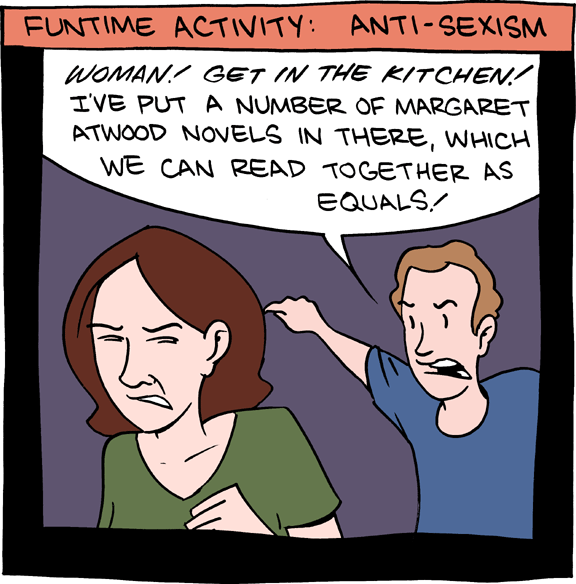
Instead, people will read it and think, "Of course they're going to read Margaret Atwood novels together as equals - what romantic couple doesn't read Margaret Atwood together? Wait, why is he yelling about it? I'm confused."
| The Daily Show With Jon Stewart | Mon - Thurs 11p / 10c | |||
| Tone Def Poetry Jam - Lyrics Controversy | ||||
| www.thedailyshow.com | ||||
| ||||
 |
| Glee's Chris Colfer, with the show's creators, Brad Falchuck and Ryan Murphy. Murphy is a judge on The Glee Project. (Photo courtesy of vagueonthehow) |

I have a stack of annotated bibliographies waiting to be graded on my coffee table. What does that mean? Basically, I’d rather do anything else than actually grade them, therefore I decided to surf a few of my favorite websites, a situation that led me to some very interesting articles about the situation of SAHDs or Stay At Home Dads.
Incidentally, this post has no intention of declaring one gender as more suited to staying at home, nor do I wish to belittle the efforts and beliefs of those who choose to do so (my own mother was a stay home mom, and a damn good one too). I merely find the points that these articles raise to be unique; all three articles made me reconsider and rethink the way that I view choosing to stay at home with your children. I think that the questions that these articles promote to be valuable in any kind of feminist discussion, especially since I believe that true feminism is concerned with gender relations and removing sexism from both genders, male and female.
Several months ago the popular feminist blog, Feminist Mormon Housewives, featured an enlightening guest post from a SAHD named Stephen. In his article he discussed his reasons for becoming a SAHD and the fulfillment, concerns and questions his particular circumstances raised in his life.
While Stephen makes a profound statement about the way that a working parent may sometimes view the stay at home parent’s time, (he points out that often the working parent may view the other parent’s time as less-valuable or more flexible) on the whole he views his time as a SAHD as a positive one. Besides that, Stephen is an engaging and humorous author (a fact that makes his article my favorite).
In his final few paragraphs he explains that while he was the primary breadwinner he expected his wife to bend to his schedule and to accommodate the needs of his time; it wasn’t until he became a SAHD and chaffed under a similar attitude of his wife’s, that he understood how frustrating that situation could be.
http://www.feministmormonhousewives.org/?p=5463
*Stephen’s article is based on several religious sources and ideals, but the point he makes at the end of his article is definitely a general feminist concern.
On to the article in the New York Times, which is a guest post by a SAHD in response to the release of a new book, Torn, by Samantha Walravens; a book that features essays by women about working vs. staying at home.
http://parenting.blogs.nytimes.com/2011/06/29/the-doubts-of-a-stay-at-home-dad/#more-23947
Vincent O’Keefe is the guest writer and his argument (or rather concern) is a unique one. He wonders whether his example of staying at home has sent his daughters an anti-feminist message, since it still shows separate gender roles and the financial dependence of one gender on the other. It’s an interesting concept, and one that I think O’Keefe says better so I’ll include a direct quote for clarification; “In larger terms, is a stay-at-home father actually anti-feminist in some ways, since he contributes to traditional breadwinner/homemaker roles, just with different genders — roles that will most likely continue to put more pressure on women than men to tether their ambition for their children’s sake?
While I had always wanted an equal division of labor within the home, I’d never considered the issue in terms of SAHDs. Does the division of labor (no matter who does it) ultimately send a negative idea about housework and raising a family to our children? I know I have more thoughts about this, but I’m struggling to put them into words.
However, my night of work-avoidance didn’t stop there as I discovered another article that dealt with O’Keefe’s and the issue of stay at home
parents.
I encountered
this article on mommyish (a website I don’t normally frequent), which offers a rebuttal to the
point made in the New York Times article. Here the author makes the argument that, “choosing to prioritize family (regardless of gender) can absolutely be a fem
inist decision. So often, breadwinner/homemaker debates fail to recognize that parenting and domestic responsibilities are work. Cooking meals, doing laundry, changing diapers, keeping tabs on doctor’s appointments is a vital contribution to families that deserves just as much respect as bringing home a paycheck. To assume that stay-home-parents are somehow “not working” by assuming a domestic role slights both men and women who have devoted themselves to maintaining a home.”
Again, another great point! Was there no end to the discussion? By this point a felt a little like I was going in rounds. Some say yes, some say no, yet all make valuable arguments.
After reading and thinking about the various angles presented in these articles I finally managed to settle on a place for myself (though it sort of feels like a cop-out to me). I think that a fair division of labor is really the only way to go; such a division seems to be the only way to attempt to break out of defined gender roles (no matter who’s doing what).
Now of course, is a true division of labor actually possible or am I merely being idealistic? Probably idealistic, however I do think it’s always positive to have goal.
(Please don't take the top graphic as any kind of commentary; the little boy's face just cracked me up)